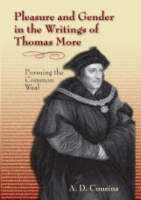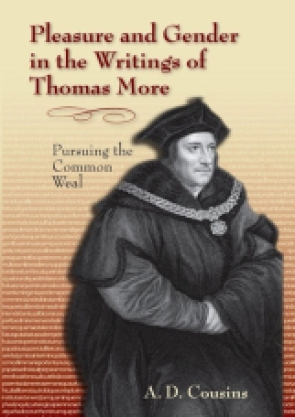Pleasure and Gender in the Writings of Thomas More
Pursuing the Common Weal
A. D. Cousins
A prominent scholar of the life and work of Thomas More, A. D. Cousins goes beyond the scope of existing studies to focus primarily and closely on More’s interpretations of the major cultural categories informing his view of the common weal, the common good, and correlatively on the (good) state. Thus, this study identifies categories that relate to the individual in civil life, categories that are pervasive and interconnected within More’s nonpolemical writings—most specifically, Cousins focuses on pleasure and gender, considering chance, friendship, and role-play throughout.
- Description
- Bio
- Subjects
Exploring pleasure and gender in relation to issues of the common good and of the (good) state, More probes how people make sense of chance (and, alternatively, how they do not), how friendship works interpersonally and beyond national boundaries, and what roles people play (as well as to what roles they can aspire). As Cousins asserts, pursuing the common weal was for More both necessary and desirable, and he himself pursued this on behalf of his country, the republic of letters, and the Church Militant. argues that, from what appears to be his earliest nonpolemical work, Pageant Verses, until what we know to be his last, De Tristitia Christi, More sees the will to pleasure as central to the experience of being human: as a primary human impulse or, at the least, a compelling power within the human consciousness. In tracing how More examines the will to pleasure in our lives, Cousins also examines More’s recurrent concern with gender’s inflecting and expressing this desire. More clearly views gender as potentially restrictive or empowering in many respects, which is discussed in relation to several of More’s texts.
A. D. Cousins is professor of philosophy and head of the English Department at Macquarie University, Australia, as well as a fellow of the Australian Academy of the Humanities and a member of the Order of Australia. He is the author of Shakespeare’s Sonnets and Narrative Poems (2000) and The Catholic Religious Poets from Southwell to Crashaw (1991) and the coeditor of Ben Jonson and the Politics of Genre (2009).
Mailing List
Subscribe to our mailing list and be notified about new titles, journals and catalogs.




